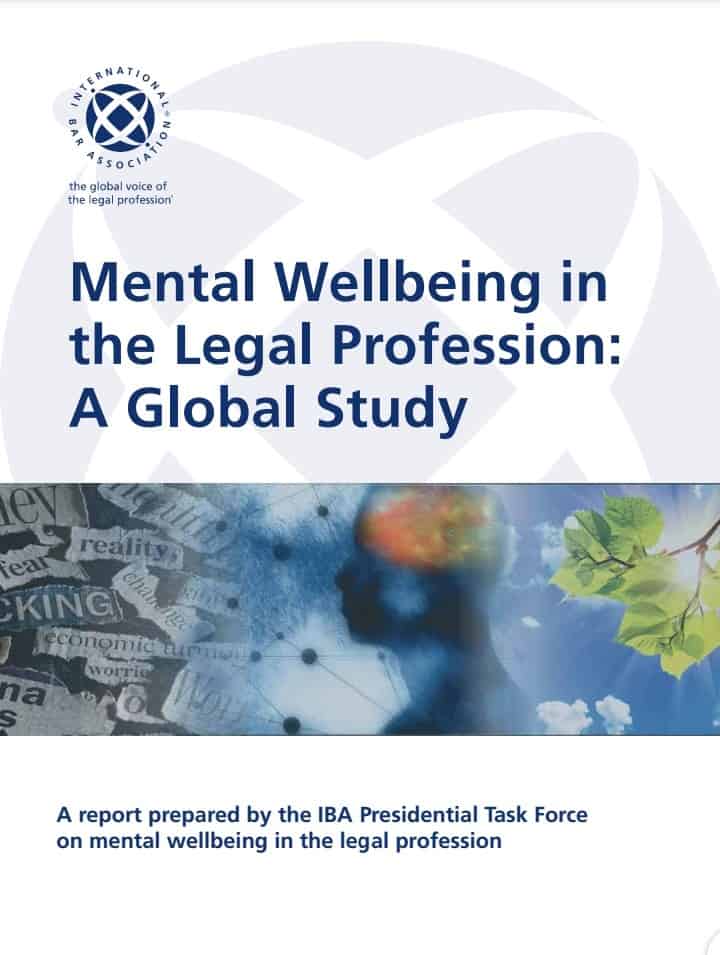Following the first ever global surveys examining the mental wellbeing of legal professionals at both an individual and institutional level, a new International Bar Association (IBA) report identifies worrying mental wellbeing trends across the profession and provides ten principles for legal workplaces and organisations to help address the crisis.
The Co-Chairs of the Taskforce that led the project, Steven Richman, Member, Clark Hill PLC, Princeton, and Deborah Enix-Ross, Senior Advisor, International Dispute Resolution Group at Debevoise & Plimpton, New York, stated: ‘It is our hope that the mental wellbeing principles set out in the report will aid the legal profession in urgently responding to the crisis. For solutions to be implemented there must first be acknowledgement that mental wellbeing matters and that it does not denote weakness.
The report is a call to action. It is our hope and intention that it will be used around the world to further the work of implementing practical solutions to what is a global crisis. The indefatigable work of the IBA Legal Policy & Research Unit team led by Sara Carnegie and George Artley in conducting the international surveys has made this report possible and we extend our gratitude’.
[mks_button size=”medium” title=”Click To Download Report” style=”squared” url=”https://www.ibanet.org/document?id=IBA-report-Mental-Wellbeing-in-the-Legal-Profession-A-Global-Study” target=”_self” bg_color=”#000000″ txt_color=”#FFFFFF” icon=”” icon_type=”” nofollow=”0″]
Former IBA President Horacio Bernardes Neto, senior partner at Motta Fernandes Advogados, São Paulo, Brazil, who was responsible for establishing the mental wellbeing taskforce, commented: ‘The conclusions and principles contained in this report represent an important step in addressing the global crisis in lawyer mental wellbeing. Being able to bring people together from across the world to share their experiences, knowledge and expertise has been crucial in amassing the data for this report. I am impressed by the cooperation of international colleagues to be frank in their responses so that our profession may face and remedy this crisis. I congratulate the Taskforce for its efforts and look forward to further IBA initiatives in geared towards improving the mental wellbeing of us all’.
The principles set out in the report to address the mental wellbeing crisis include:
Adopt a policy – Law firms should adopt a mental wellbeing policy and undertake regular assessment of their employees’ mental wellbeing. The policy must: be a collaborative effort involving colleagues from across the organisation, of differing levels of seniority; include detail of systems for mental health disclosures; state what staff should expect from the organisation regarding mental wellbeing; and have appropriate funding, monitoring and evaluation processes in place.
Address systemic problems – For mental wellbeing in the legal profession to improve, the underlying and fundamental causes must be addressed. The report identified a number of working practices that are problematic for mental health, including: poor or non-existent managerial training; bullying, harassment, sexism and racism; and a culture of unsustainable working hours and high billing targets, particularly for junior members of the profession.
Prioritise mental wellbeing – Legal organisations should acknowledge the impact poor mental health has on the profession, as lawyers who are struggling may not be able to serve clients to the best of their ability; and recognise that employers, regulators and professional bodies have a duty to protect and promote the health of their employees and members. Fostering a working culture where mental health is prioritised, and good practise is modelled by leadership, is a key part of this. In addition, any negative perceptions of mental health difficulties should be challenged to ensure that individuals feel able to have an open and honest dialogue, without fear of repercussions for their career.
Recognise intersectionalities – The difficulties experienced by specific groups, including younger, female, ethnic minority, and legal professionals with disabilities, must be better understood and acknowledged by the legal community. Law firms must make a sustained and meaningful effort to foster equality, diversity and inclusion within the workplace.
Noting the wider importance of the findings of the report, IBA President Sternford Moyo, commented: ‘The COVID-19 pandemic has forced many to evaluate what is most important in life and how our careers contribute, or not, to our mental wellbeing and sense of purpose. This report could not be more timely or relevant. Raising awareness and open dialogue and communication are fundamental for change to occur. But this must not be where we stop. Regular assessments and well devised and implemented policies are key. In a developing and demanding global culture where the delineation between work and other areas of life is increasingly blurred, this report demonstrates that we can, with the right tools and emphasis recalibrate and find better balance. I commend this report and recommend it to anyone intent on being part of the solution to the to the mental wellbeing crisis in the legal profession’.
Courtesy: loyalnigerianlawyer








